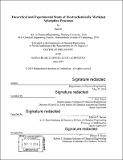Theoretical and experimental study of electrochemically mediated adsorption processes
Author(s)
He, Fan,Ph.D.Massachusetts Institute of Technology.
Download1138253416-MIT.pdf (27.43Mb)
Other Contributors
Massachusetts Institute of Technology. Department of Chemical Engineering.
Advisor
T. Alan Hatton and Martin Z. Bazant.
Terms of use
Metadata
Show full item recordAbstract
Water treatment by electrosorption is a topic of increasing interest in recent years due to the high efficiency, low cost, small footprint and no secondary treatment required. Electrochemically mediated adsorption, is one of the emerging electrosorption techniques. The great advantage of this technique is its superb selectivity (>100), which allows selective removal of toxic or recovery of high-valued target ions under low energy consumption, which is difficult to achieve by any other water treatment techniques. Firstly, to understand electrochemically mediated adsorption, theoretical approach has been used. Models with hierarchical complexity have been developed in this thesis; ranging from a physics-based equivalent circuit model to process-level lumped parameter model and eventually to a full two-dimensional time dependent transport model, which allow focuses on different aspects of the process (thermodynamics, kinetics and mass transport) and shed light on the mechanism of competitive electrosorption processes from microscale to macroscale. The theoretical framework also provides guidelines of designing redox active materials and optimizing operation conditions to achieve high salt adsorption capacity as well as selectivity towards target micropollutants. Secondly, we study the electrochemically mediated adsorption in practice. By setting up a continuous flow experimental platform equipped with inline sensors, we developed methodologies to allow real-time measurement of the salt adsorption performance as well as quantifying the selectivity of the competitive electrosorption process. Asymmetric redox active electrodes are designed, synthesized and characterized in the flow system. The experimental study has demonstrated high salt adsorption capacity and ultra-high salt adsorption rate for brackish water deionization; and more importantly, selective removal of organic acid for waste water remediation. Finally, we extend the concept and methodology of electrochemically mediated adsorption from surface based (heterogeneous) electrosorption to bulk adsorption/regeneration with (homogeneous) complexation reactions. A theoretical framework is developed under flow-through configuration, and applied to carbon dioxide capture/release, which is of great practical interest. Improved reactor design has also been implemented and tested, which demonstrates the feasibility of utilizing the flow-through reactor for electrochemically mediated carbon capture and regeneration.
Description
Thesis: Ph. D., Massachusetts Institute of Technology, Department of Chemical Engineering, 2019 Cataloged from PDF version of thesis. Includes bibliographical references (pages 238-248).
Date issued
2019Department
Massachusetts Institute of Technology. Department of Chemical EngineeringPublisher
Massachusetts Institute of Technology
Keywords
Chemical Engineering.